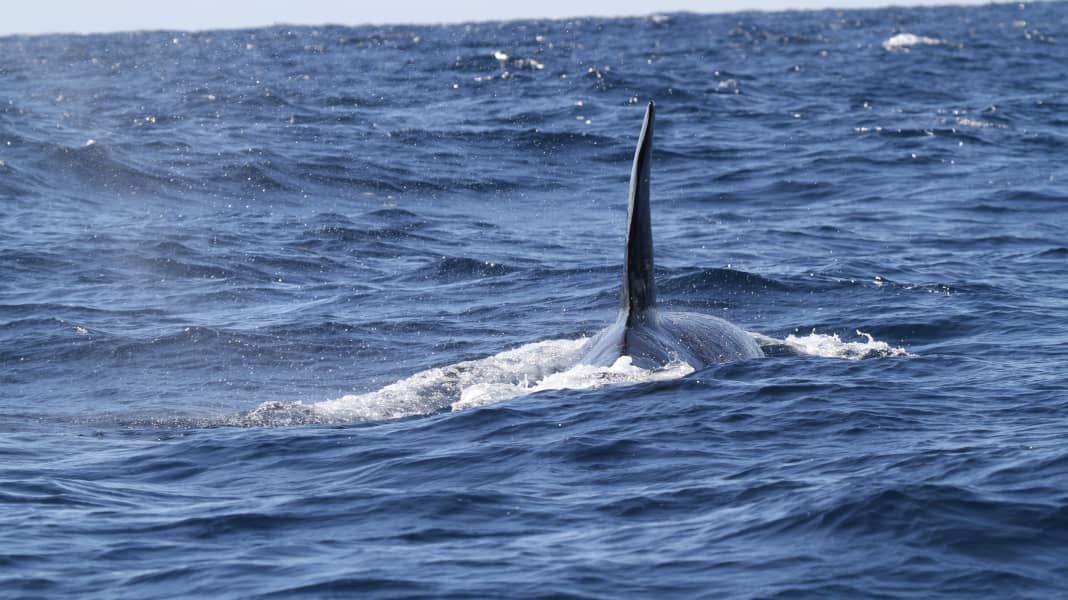
Just under a week ago, a Belgian sailing couple experienced an unexpected sea emergency off the coast of Bigoudène: their sailing boat was attacked by two orcas. The damage caused by the young whales rendered their boat unseaworthy and required a tow to the harbour of Guilvinec by French sea rescuers.
The yacht in question was the 11.80 metre long wooden yacht "Pieterjan", built in 2021, and the incident occurred around 800 nautical miles off the French coast on the return journey from the Azores.
More on the topic:
Special defence measure
Skipper John explains in a video: "The autopilot had failed, so I went into the cockpit. I saw two orcas behind the boat and a piece of the rudder blade was floating about 20 metres away. By then the rudder was no longer working properly."
Apparently, the couple then used a special tactic: The sails were recovered, the engine was started and reversed. This made it less easy for the orcas to safely attack the rudder blade from behind. The animals would have quickly lost interest.
During the operation, however, the rudder was knocked sideways, damaging the rudder linkage and rendering the yacht unmanoeuvrable. The sea rescuers who were called out towed the yacht to Guilvinec, where it is to be repaired.
A new orca threat?
The incident is notable as it occurred 800 nautical miles north of the Strait of Gibraltar, where most killer whale attacks are traditionally recorded. This indicates a possible expansion of the areas where killer whales interact with boats.
Since July 2020, almost 700 interactions between killer whales and boats have been recorded along the Atlantic and Mediterranean coasts in Europe and North Africa. Around half of these have caused damage to the boats, often by the killer whales attacking the rudder with great precision.
Studies show that a population of Iberian killer whales, consisting of around 35 individuals, is responsible for many of these attacks. However, it is unclear which population of European killer whales is behind the latest incident in Brittany.
Recommendations for sailors
Some of the recommendations for sailors on orca defence are contradictory. On the one hand, it is advised to slow down, switch off the engine or lower the sails, switch off the autopilot and sonar and move the rudder as little as possible. The animals would get bored so quickly.
However, the opposite has proven to be more effective. Instead of standing still, the authorities now recommend that every yacht in the event of an orca interaction should lower its sails, start the engine and head for the shallowest possible waters as quickly as possible until the orcas lose interest.
In addition, the orcas should be photographed and every skipper is obliged to report orca interactions to the nearest rescue control centre (CCS) via the corresponding VHF channels (channel 16 or working channel).
In addition, people on board should not approach the edges and should ensure that they are in places that offer the greatest possible protection from possible sudden movements of the yacht.
Brutal methods
Each skipper must decide for himself whether one of the following defence measures is justified, as they can harm the animals.
Sand
Fishermen have been advised to spread sand to confuse the orcas' sonar. However, it is pointless to deploy sand at full speed, because at a speed of five knots through the water it immediately drives them away like any other deployed substance. Sand should only be spread when stationary and then in large quantities, by the bagful.
Firecrackers
Former Trans-Ocean board member Martin Birkhoff on his website reported. He experienced two short, violent orca attacks and used so-called fire crackers as a last resort after the expiration, which ended the interactions.
Thorns
Specially manufactured steel rings in profile form with long spikes protruding from the sides are placed over the rudder blade. It is not known whether this martial method works.
Pinging
The North German company F3 Maritime Technology offers a pinger for yacht crews that is designed to keep whales at bay.

